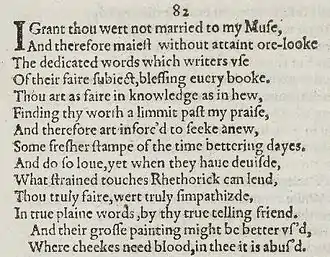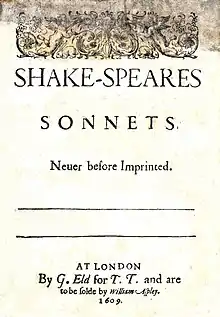| Sonnet 82 | |||||||
|---|---|---|---|---|---|---|---|
 Sonnet 82 in the 1609 Quarto | |||||||
| |||||||
Sonnet 82 is one of 154 sonnets published by William Shakespeare in a quarto titled Shakespeare's Sonnets in 1609. It is a part of the Fair Youth series of sonnets, and the fifth sonnet of the Rival Poet group.
Exegesis
The speaker begins by allowing that the youth is not required to read only one poet. The speaker considers the words that other authors use. "Dedicated words" (line 3) refers to words used to dedicate their writings to the young man, and it could also refer to the writings themselves. The other writers use "dedicated words" indiscriminately in "blessing every book”; their mode is to use some "fresher stamp” that happens to be in fashion (line 8), which is the “strained touches” of rhetoric (line 10). Worst of all, other poets words take the form of unnecessary cosmetics (lines 13 - 14). Since the youth needs no flattery, all this does not compare well to the poet's description of his own better suited "plain words" (lines 11 - 12).[2][3][4]
Structure
Sonnet 82 is an English or Shakespearean sonnet, which has three quatrains, followed by a final rhyming couplet. It follows the rhyme scheme ABAB CDCD EFEF GG and is composed in iambic pentameter, a metre of five feet per line, with two syllables in each foot accented weak/strong. Most of the lines are examples of regular iambic pentameter, including the 2nd line:
× / × / × / × / × / And therefore mayst without attaint o'erlook (82.2)
- / = ictus, a metrically strong syllabic position. × = nonictus.
The sonnet exhibits a few variations of the meter, some of which will depend on interpretation. The following lines may be read with metrical regularity, but also may be read with a rightward movement of the first ictus in line 4 (resulting in a four-position figure, × × / /, sometimes referred to as a minor ionic); and an initial reversal in line 5:
× × / / × / × / × / Of their fair subject, blessing every book. / × × / × / × / × / Thou art as fair in knowledge as in hue, (82.4-5)
A reversal and minor ionic may be found in lines 6 and 8, respectively.
The meter calls for line 10's "strainèd" to be pronounced with 2 syllables.[5]
Notes
- ↑ Shakespeare, William. Duncan-Jones, Katherine. Shakespeare’s Sonnets. Bloomsbury Arden 2010. p. 273 ISBN 9781408017975.
- ↑ Shakespeare, William. Duncan-Jones, Katherine. Shakespeare’s Sonnets. Bloomsbury Arden 2010. p. 274-275 ISBN 9781408017975.
- ↑ Booth, Stephen, ed. Shakespeare's Sonnets (Rev. ed.). New Haven: Yale Nota Bene. (2000) ASIN: B01K0QGSW2
- ↑ Hammond, Gerald. The Reader and the Young Man Sonnets. Barnes & Noble. 1981. p. 105. ISBN 978-1-349-05443-5
- ↑ Booth 2000, p. 72.
References
- First edition and facsimile
- Shakespeare, William (1609). Shake-speares Sonnets: Never Before Imprinted. London: Thomas Thorpe.
- Lee, Sidney, ed. (1905). Shakespeares Sonnets: Being a reproduction in facsimile of the first edition. Oxford: Clarendon Press. OCLC 458829162.
- Variorum editions
- Alden, Raymond Macdonald, ed. (1916). The Sonnets of Shakespeare. Boston: Houghton Mifflin Harcourt. OCLC 234756.
- Rollins, Hyder Edward, ed. (1944). A New Variorum Edition of Shakespeare: The Sonnets [2 Volumes]. Philadelphia: J. B. Lippincott & Co. OCLC 6028485. — Volume I and Volume II at the Internet Archive
- Modern critical editions
- Atkins, Carl D., ed. (2007). Shakespeare's Sonnets: With Three Hundred Years of Commentary. Madison: Fairleigh Dickinson University Press. ISBN 978-0-8386-4163-7. OCLC 86090499.
- Booth, Stephen, ed. (2000) [1st ed. 1977]. Shakespeare's Sonnets (Rev. ed.). New Haven: Yale Nota Bene. ISBN 0-300-01959-9. OCLC 2968040.
- Burrow, Colin, ed. (2002). The Complete Sonnets and Poems. The Oxford Shakespeare. Oxford: Oxford University Press. ISBN 978-0192819338. OCLC 48532938.
- Duncan-Jones, Katherine, ed. (2010) [1st ed. 1997]. Shakespeare's Sonnets. Arden Shakespeare, third series (Rev. ed.). London: Bloomsbury. ISBN 978-1-4080-1797-5. OCLC 755065951. — 1st edition at the Internet Archive
- Evans, G. Blakemore, ed. (1996). The Sonnets. The New Cambridge Shakespeare. Cambridge: Cambridge University Press. ISBN 978-0521294034. OCLC 32272082.
- Kerrigan, John, ed. (1995) [1st ed. 1986]. The Sonnets ; and, A Lover's Complaint. New Penguin Shakespeare (Rev. ed.). Penguin Books. ISBN 0-14-070732-8. OCLC 15018446.
- Mowat, Barbara A.; Werstine, Paul, eds. (2006). Shakespeare's Sonnets & Poems. Folger Shakespeare Library. New York: Washington Square Press. ISBN 978-0743273282. OCLC 64594469.
- Orgel, Stephen, ed. (2001). The Sonnets. The Pelican Shakespeare (Rev. ed.). New York: Penguin Books. ISBN 978-0140714531. OCLC 46683809.
- Vendler, Helen, ed. (1997). The Art of Shakespeare's Sonnets. Cambridge, Massachusetts: The Belknap Press of Harvard University Press. ISBN 0-674-63712-7. OCLC 36806589.
.png.webp)
